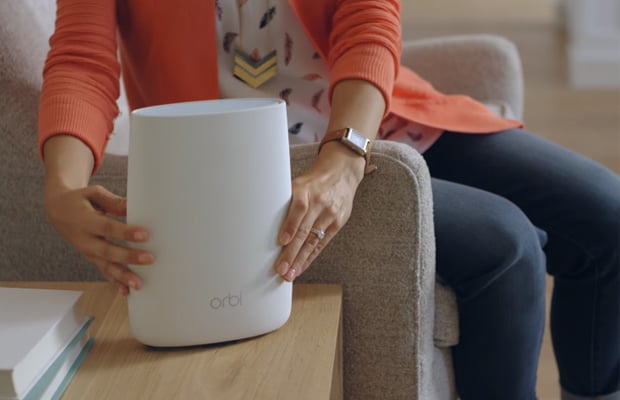Netgear Orbi Mesh Router Beams High-Speed Wi-Fi, Buries Your Home’s Dead Zones

Call it a first-world problem if you like, but the larger your home, the trickier it can be blanketing it in wireless connectivity. Dead zones have a nasty habit of popping up in remote corners separated by walls and doors, and that's one of the reasons why your choice in router matters. It's also the main selling point of Netgear's new Orbi Wi-Fi System.
There's a lot of fancy marketing speak associated with Orbi but what it essentially boils down to is an easy-to-configure router and range extender (more on that in a moment), the latter of which Netgear calls a satellite. Like Google's OnHub series, the Orbi doesn't look like a traditional router that you'd feel compelled to hide in the bedroom closet, though you can. Instead, it's designed to sit out in the open and coexist with a modern decor—you may choose to plop the router in the corner of your downstairs living room and nearly identical looking satellite upstairs on the other end of the house, as show below:

Netgear claims an Orbi Wi-Fi System with router and satellite can easily cover an area up to 4,000 square feet of a typical home, infiltrating those dead zones and ensuring that wireless connectivity doesn't drop out just because you wandered from one area of your house to another. For even larger homes, Netgear plans to offer kits with additional satellites, as well as sell standalone satellites as add-ons for the Orbi.
If you have dead zones, why not just get a range extender for your existing network? While Orbi is similar, it creates a mesh network, which isn't exactly the same thing. Netgear thumps its chest over Orbi supposedly being the only system to leverage tri-band Wi-Fi consisting of a dedicated 1.7Gbps 5GHz band for extending connectivity to Orbi satellites, leaving both the 2.4GHz and 5GHz bands, each with 256QAM support, fully available for full-speed access no matter where you are in your home.
"Tri-band Wi-Fi is similar to a virtual wire, delivering maximum speeds no matter how many devices connect. This dedicated wireless connection ensures far-reaching coverage, empowering you to enjoy uninterrupted Wi-Fi connections with the fastest internet speeds that you are paying your service provider for," Netflix explains.
The main router also has a built-in 4-port gigabit Ethernet switch and a single USB 2.0 port, presumably for connecting USB printers and/or storage devices, though the latter would be bogged down by USB 2.0's low transfer speeds.
As for setup, you plug the router in and configure things through your smartphone. Once installed, the Orbi updates itself automatically with the latest firmware
The Orbi Wi-Fi System with router and satellite will be available next month for $400.

